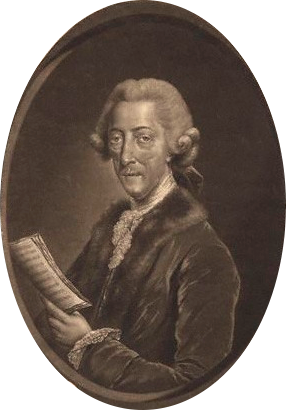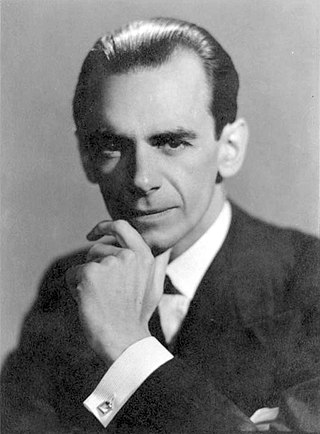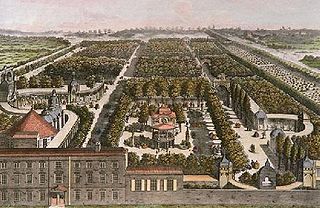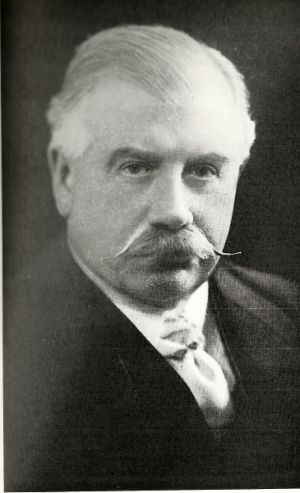
The BBC Proms is an eight-week summer season of daily orchestral classical music concerts and other events held annually, predominantly in the Royal Albert Hall in central London. Robert Newman founded The Proms in 1895. Since 1927, the BBC has organised and broadcast The Proms. Each season consists of concerts in the Royal Albert Hall, chamber music concerts at Cadogan Hall, additional Proms in the Park events across the UK on the Last Night of the Proms, and associated educational and children's events. The season is a significant event in British culture and in classical music. Czech conductor Jiří Bělohlávek described the Proms as "the world's largest and most democratic musical festival".

Thomas Augustine Arne was an English composer. He is best known for his patriotic song "Rule, Britannia!" and the song "A-Hunting We Will Go", the latter composed for a 1777 production of The Beggar's Opera, which has since become popular as a folk song and a nursery rhyme. Arne was a leading British theatre composer of the 18th century, working at the West End's Drury Lane and Covent Garden. He wrote many operatic entertainments for the London theatres and pleasure gardens, as well as concertos, sinfonias, and sonatas.

Michael Arne was an English composer, harpsichordist, organist, singer, and actor. He was the son of the composer Thomas Arne and the soprano Cecilia Young, a member of the famous Young family of musicians of the seventeenth and eighteenth centuries. Like his father, Arne worked primarily as a composer of stage music and vocal art song, contributing little to other genres of music. He wrote several songs for London's pleasure gardens, the most famous of which is Lass with the Delicate Air (1762). A moderately prolific composer, Arne wrote nine operas and collaborated on at least 15 others. His most successful opera, Cymon (1767), enjoyed several revivals during his lifetime and into the early nineteenth century.

Sir Henry Joseph Wood was an English conductor best known for his association with London's annual series of promenade concerts, known as the Proms. He conducted them for nearly half a century, introducing hundreds of new works to British audiences. After his death, the concerts were officially renamed in his honour as the "Henry Wood Promenade Concerts", although they continued to be generally referred to as "the Proms".

Sir Harold Malcolm Watts Sargent was an English conductor, organist and composer widely regarded as Britain's leading conductor of choral works. The musical ensembles with which he was associated included the Ballets Russes, the Huddersfield Choral Society, the Royal Choral Society, the D'Oyly Carte Opera Company, and the London Philharmonic, Hallé, Liverpool Philharmonic, BBC Symphony and Royal Philharmonic orchestras. Sargent was held in high esteem by choirs and instrumental soloists, but because of his high standards and a statement that he made in a 1936 interview disputing musicians' rights to tenure, his relationship with orchestral players was often uneasy. Despite this, he was co-founder of the London Philharmonic, was the first conductor of the Liverpool Philharmonic as a full-time ensemble, and played an important part in saving the Royal Philharmonic Orchestra from disbandment in the 1960s.

The Queen's Hall was a concert hall in Langham Place, London, opened in 1893. Designed by the architect Thomas Knightley, it had room for an audience of about 2,500 people. It became London's principal concert venue. From 1895 until 1941, it was the home of the promenade concerts founded by Robert Newman together with Henry Wood. The hall had drab decor and cramped seating but superb acoustics. It became known as the "musical centre of the [British] Empire", and several of the leading musicians and composers of the late 19th and early 20th centuries performed there, including Claude Debussy, Edward Elgar, Maurice Ravel and Richard Strauss.

Vauxhall Gardens is a public park in Kennington in the London Borough of Lambeth, England, on the south bank of the River Thames.

Ranelagh Gardens were public pleasure gardens located in Chelsea, then just outside London, England, in the 18th century.

Louis George Maurice Adolphe Roche Albert Abel Antonio Alexandre Noë Jean Lucien Daniel Eugène Joseph-le-brun Joseph-Barême Thomas Thomas Thomas-Thomas Pierre Arbon Pierre-Maurel Barthélemi Artus Alphonse Bertrand Dieudonné Emanuel Josué Vincent Luc Michel Jules-de-la-plane Jules-Bazin Julio César Jullien, who shortened his name to Louis-Antoine Jullien, was a French conductor and composer of light music.

William Henry Squire, ARCM was a British cellist, composer and music professor of the late 19th and early 20th centuries. He studied cello at the Royal College of Music, and became professor of cello at the Royal College and Guildhall schools of music.

Light music is a less-serious form of Western classical music, which originated in the 18th and 19th centuries and continues today. Its heyday was in the mid‑20th century. The style is through-composed, usually shorter orchestral pieces and suites designed to appeal to a wider context and audience than more sophisticated forms such as the concerto, the symphony and the opera.

Robert Newman was an English businessman and musical impresario. He is most celebrated as the founder of the series of classical music concerts that are now known as The Proms.

Royal Surrey Gardens were pleasure gardens in Newington, Surrey, London in the Victorian period, slightly east of The Oval. The gardens occupied about 15 acres (6.1 ha) to the east side of Kennington Park Road, including a lake of about 3 acres (1.2 ha). It was the site of Surrey Zoological Gardens and Surrey Music Hall.
Adam Von Ahnen Carse was an English composer, academic, music writer and editor, remembered today for his studies on the history of instruments and the orchestra, and for his educational music. His collection of around 350 antique wind instruments is now in the Horniman Museum.

The Vauxhall Gardens, was a pleasure garden and theater. It was named for the Vauxhall Gardens of London. Though the venue passed through a long list of owners, and suffered buyouts, closings, relocations, and re-openings, it lasted until the mid-19th century.
Cecilia Young was one of the greatest English sopranos of the eighteenth century, the wife of composer Thomas Arne, and the mother of composer Michael Arne. According to the music historian Charles Burney, she had "a good natural voice and a fine shake [and] had been so well taught, that her style of singing was infinitely superior to that of any other English woman of her time". She was part of a well-known English family of musicians that included several professional singers and organists. Young enjoyed a large amount of success through her close association with George Frideric Handel. She appeared in several of his oratorios and operas including the premieres of Ariodante (1735), Alcina (1735), Alexander's Feast (1736) and Saul (1739).
Michael Christian Festing was an English violinist and composer. His reputation lies mostly on his work as a violin virtuoso.
Masquerade is a single-movement orchestral composition by the British-born composer Anna Clyne. The work was commissioned by the BBC and it was first performed on 7 September 2013 at the Last Night of the Proms by the BBC Symphony Orchestra under conductor Marin Alsop. Clyne dedicated the piece to the Proms' concertgoers colloquially known as the "Prommers".

Philippe Musard was a French composer who was crucial to the development and popularity of the promenade concert. One of the most famous personalities of Europe during the 1830s and 1840s, his concerts in Paris and London were riotous successes. Best known for his "galop" and "quadrille" pieces, he composed many of these numbers himself, usually borrowing famous themes of other composers. Musard plays an important role in the development of light classical music, the faculty of publicity in music, and in the role of the conductor as a musical celebrity. He has been largely forgotten subsequent to his retirement in the early 1850s.

Albert Fransella was a virtuoso flutist and principal flutist of Dutch and British orchestras between 1880 and 1925.

















